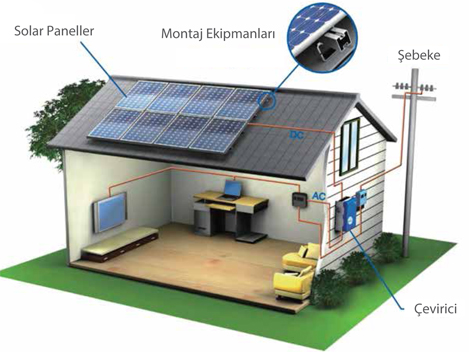
Home Solar Energy Systems
Home Solar Energy Systems
When considering installation and cost, you might think that a home solar energy system requires a large initial investment. However, it’s no different from building an elegant winter garden—yes, you spend some money at the beginning, but in the long run, you gain much more than you invested. Solar energy can significantly reduce your electricity bills. Some systems can even generate excess energy that can be sold back to the grid. And who wouldn’t want to save money?
Environmental benefits are another major advantage. Solar energy is far less harmful to the environment compared to fossil fuels. Reducing your carbon footprint is an important step for our planet. Imagine leaving a cleaner and more livable world for your children and grandchildren.
Long lifespan and low maintenance are also key factors. Solar panels are generally durable and require minimal maintenance. With advancing technology, efficiency rates continue to improve—making it possible to generate more energy with fewer panels over time.
Home solar energy systems can be a major step toward protecting both your budget and the planet. You now have the chance to use the sun’s power at home and contribute to a cleaner future.
How Do Solar Panels Work?
The working principle of solar panels forms the basis of future energy solutions. So, how do these panels operate? Designed to convert sunlight into electricity, solar panels use photovoltaic cells that absorb sunlight and trigger electron movement. When sunlight hits the cells, electrons are released, creating an electrical current.
But the process doesn’t end with the panels! Smart inverters play a critical role. While solar panels produce constantly varying DC (direct current), the electricity used in your home is AC (alternating current). A smart inverter converts DC into AC, making the energy usable for home appliances. Additionally, modern inverters help enhance efficiency and monitor system performance.
The combination of solar panels and smart inverters is an ideal solution for those looking to reduce both energy costs and environmental impact. As more people turn to renewable energy to reduce fossil fuel dependence, solar energy stands out as a clean, efficient, and cost-saving option. Let the sun brighten your energy future!
What Is an Inverter?
An inverter works closely with an energy storage system. In solar energy setups, the electricity produced is usually stored in a battery first. The inverter then converts this stored energy into a usable form for home appliances. For example, while your panels generate energy during the day, it is the inverter that allows you to use this energy at night. This ensures that your home remains powered even when the sun isn’t shining.
There are different types of inverters. Some are suitable for simple systems, while others are designed for more complex setups with high efficiency. Advanced inverters balance loads and optimize energy flow, preventing unnecessary energy loss. With the right inverter, you can improve efficiency and lower your electricity bills.
Inverters are essential for managing electrical energy in a sustainable way. When paired with energy storage systems, they make renewable energy use more effective. Remember—choosing the right inverter is the key to maximizing energy efficiency!
What Is an Energy Storage System?
Solar panels convert sunlight into electricity, but sunlight is not always available. This is where energy storage systems come into play. They store excess energy generated during sunny hours so you can use it whenever needed. Imagine a snowy winter day—you’re staying warm and efficient thanks to stored solar energy.
Think about enjoying the warmth provided by the sun in the morning and still having enough energy to illuminate your home at night. Energy storage systems help reduce energy costs while encouraging a sustainable lifestyle. They also support the transition away from fossil fuels.
Lithium-ion batteries are among the most common storage options, offering high energy density and long lifespan. Larger-scale storage solutions also exist, such as those used in power plants.
Energy storage systems point toward a promising future for both residential and industrial use. When integrated with solar panel systems, they protect your budget while adding an environmentally friendly touch to your home. A smart choice for the needs of the modern world!
